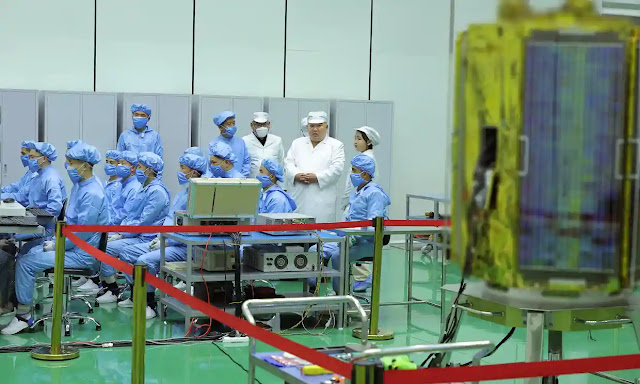After Kim Jong-un's government informed Tokyo that it intends to launch a satellite between May 31 and June 11, the Japanese military declared that it will destroy any North Korean missile that breaches its territory and is making preparations to do so.
Hirokazu Matsuno, the top cabinet secretary of Japan, claimed that any launch by North Korea, including one billed as a satellite launch, had an impact on the security of Japanese residents. "The government acknowledges that there is a chance the satellite may cross into our nation's territory."
Nuclear-armed Kim has reportedly given the go-ahead for final preparations to launch North Korea's first military surveillance satellite into space. According to analysts, a military satellite would boost North Korea's capacity to hit targets in the event of conflict and would strengthen its observation capability.
According to a statement from Japan's defense ministry, "We will take destructive measures against ballistic and other missiles that are confirmed to land in our territory."
The ministry declared that it will shoot down any such North Korean missile using either its Standard Missile-3 (SM-3) or Patriot Missile PAC-3.
Any launch of a North Korean missile would be a significant infraction of a UN security council resolution, the prime minister of Japan, Fumio Kishida, warned reporters. On Twitter, Kishida's office stated that it "strongly urges North Korea to refrain from launching," adding that it will work "with relevant countries such as the US and South Korea."
According to a representative for the US State Department, any launch of ballistic missile technology is in contravention of many UN security council resolutions. The technology used to launch satellites is comparable to that of ballistic missiles.
Japan has stated that it will make every effort to gather and examine data from the launch.
Prior to this, North Korean media has criticized South Korea, the US, and Japan's intentions to exchange real-time data on its missile launches, alleging that the three countries are talking about "sinister measures" to enhance military cooperation.
In recent months, North Korea has tested a number of missiles and weaponry, including a new solid-fuel intercontinental ballistic missile (ICBM).
The free press is being attacked by several entities. As a result of a failing economic strategy, media organizations are closing their doors. As governments regulate what can and cannot be printed, journalism is increasingly turning into propaganda throughout much of the world. Numerous reporters have been slain or imprisoned just for performing their professions in the past year alone. According to the UN, press freedom has decreased for 85% of the world's population in recent years.
We hope that when you join us today from Pakistan, you will think about helping us in our efforts to address this. We have chosen to maintain our journalism paywall-free despite the financial difficulties facing the media sector because we think everyone has a right to high-quality, fact-checked reporting. And we continue to be independent because of the kind donations of readers from all around the world who recognise the value of a free press as an investment in a well-informed and empowered public.
We don't have a wealthy owner like many others, which gives us the flexibility to pursue the truth with abandon and to report it honestly. Your help will enable us to keep up our tenacious and passionate pursuit of bringing you journalism that is never influenced by business or politics.
Whether you can contribute a small amount or a large one, do so to support the Guardian's reporting in the years to come. Please consider making a monthly donation of as little as $2 to help us. Setting it up takes less than a minute, and you can be confident that every month, you're helping to support free, independent news. I'm grateful.


